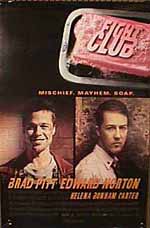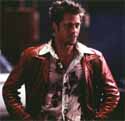
 |
 |
 |
![]()
Before I get too deep in the bullshit (mine and the movie’s) here with FIGHT CLUB, let me just state a few things for the record.
First, the nihilists are right. The current prevailing Western system of so-called "democracy" may be all smoke and mirrors, but nor is there any hope that humanity (in its current evolutionary state, anyway) might some day create a truly free and fair politicosocioeconomic system. If there is any potential whatsoever for genuine freedom and equality, it lies then in chaos and anarchy. Which means that destruction of the present, rather than building toward the future, is the only righteous goal available. Put more bluntly and succinctly, Destruction Is Good (it’s no accident that this is the precise logical antithesis to the "Greed Is Good" maxim from Oliver Stone’s Wall Street).
 |
Presumably, most folks would instinctively object to equating a "selfish" first-world junkie with a "selfless" martyr of third-world tyranny. But such a purely quantitative view ignores the inherent relativism of suffering. Consider the GULAG prisoners who discovered that temperatures of -40 could seem downright warm on the heels of a -60 spell, just one of any number of possible examples. Yet, if the experience of suffering is more precisely measured in terms of the individual’s surroundings and temporal variation than on an absolute quantitative scale, then is the self-inflicted pain of the affluent depressive any less heroic than the zealot willing to set fire to his own flesh? Well yes, it probably is, actually. But I still say that the self-destructive urge is something that should be championed and celebrated, regardless of the specific form in which it arises.
It is not quite an exaggeration to say that Fight Club is about all of these things. Its underlying message (if it has one) is that destruction--and particularly self-destruction--is inherently good. Seemingly then, I ought to be favorably disposed toward a big-budget Hollywood picture that puts out this sort of potentially subversive propaganda. And believe me, I really did want to like it, especially following positive reviews received from our own John Dolan and a handful of other reliable sources. But like it I did not.
It wasn’t the Brad Pitt factor. Unlike most folks, I don’t even particularly dislike the one-time "Sexiest Man in the World" according to People magazine. Mostly, I just think he’s silly. Many chicks, and
 |
Actually, it was the more essential Edward Norton character that I found to be almost unbearable. He may be the "most promising young actor of his generation," but I really do not care for the guy. I dislike his Guy Smiley head, and I genuinely despise his voice and slightly nervous speech patterns. I realize I’m just about the only person who feels this way, and I’m even willing to allow that I may be wrong on this one. Nevertheless, I still would have been turned against him upon reading interviews in which he describes Fight Club as "this weird millennial Catcher in the Rye." Now there’s some irrefutable proof that the old adage about not reading interviews with entertainers you admire goes double for those you’re not so keen on.
But more to the point, I guess I’m really just wondering if a film that’s so in touch with the current zeitgeist (the emasculates fin-de-siecle American male, faux anti-consumerism, millennial apocalypse) could possibly be subversive in the least. Fight Club is a fantasy almost identical to American Beauty (right down to the massive-severance-pay job-quitting scenes), albeit on a different scale, as well as more generally, say, Happiness, Office Space, and even director David Fincher’s previous release, The Game.
One the one hand, you’ve got a fairly successful terrorist organization destroying a gourmet coffee franchise. But on the other, there’s the typically self-ironic advertisement in the form of a prominent Starbuck’s product placement. In the same vein, you’ve got Brad Pitt as would-be hipster Lenin telling his underlings that the media lied to us when it told us
 |
Those inclined to overstate the movie’s importance blame its relatively poor commercial performance (the US box office take has pretty much leveled off at around $35 million, or half of the film’s budget) on its supposed message. Indeed, a few respected beigeoid critics such as Roger Ebert did take the easy way out, dismissing the film as pure fascistic propaganda or adolescent male fantasy. To be fair, there are elements of both, but there’s also something more there. Frankly, I’m more inclined to blame the film’s poor performance on its marketing campaign rather than on its message or its inherent flaws. The theatrical trailers presented the film as a typical action number, offering little clue as to its political and/or philosophical elements.
Ultimately, however, it just doesn’t matter. It never does. Hell, I suppose my main problem with Fight Club is really just that, aside from the few visually striking sequences, its final legacy may simply be to discredit the destructive urge toward chaos and anarchy in general, laying tomorrow’s potential revolutionaries open to the accusation of having copped their shtick from Brad Pitt and some guy from Portland, from a film whose unfortunate catchphrase is "Mischief. Mayhem. Soap."
And that would be a real shame.


